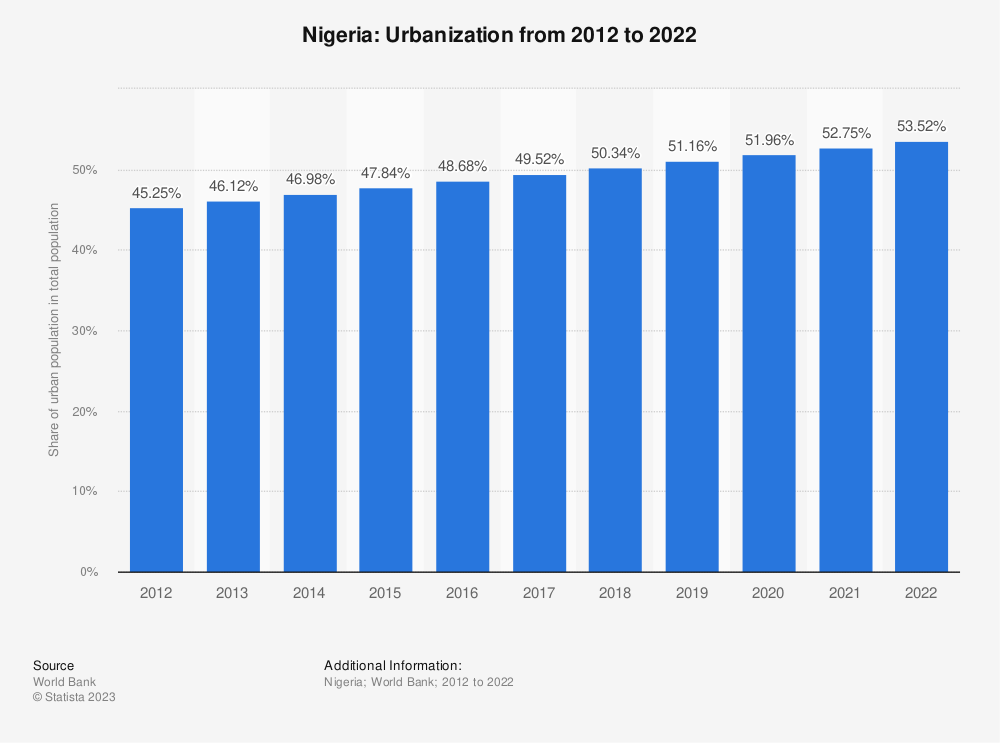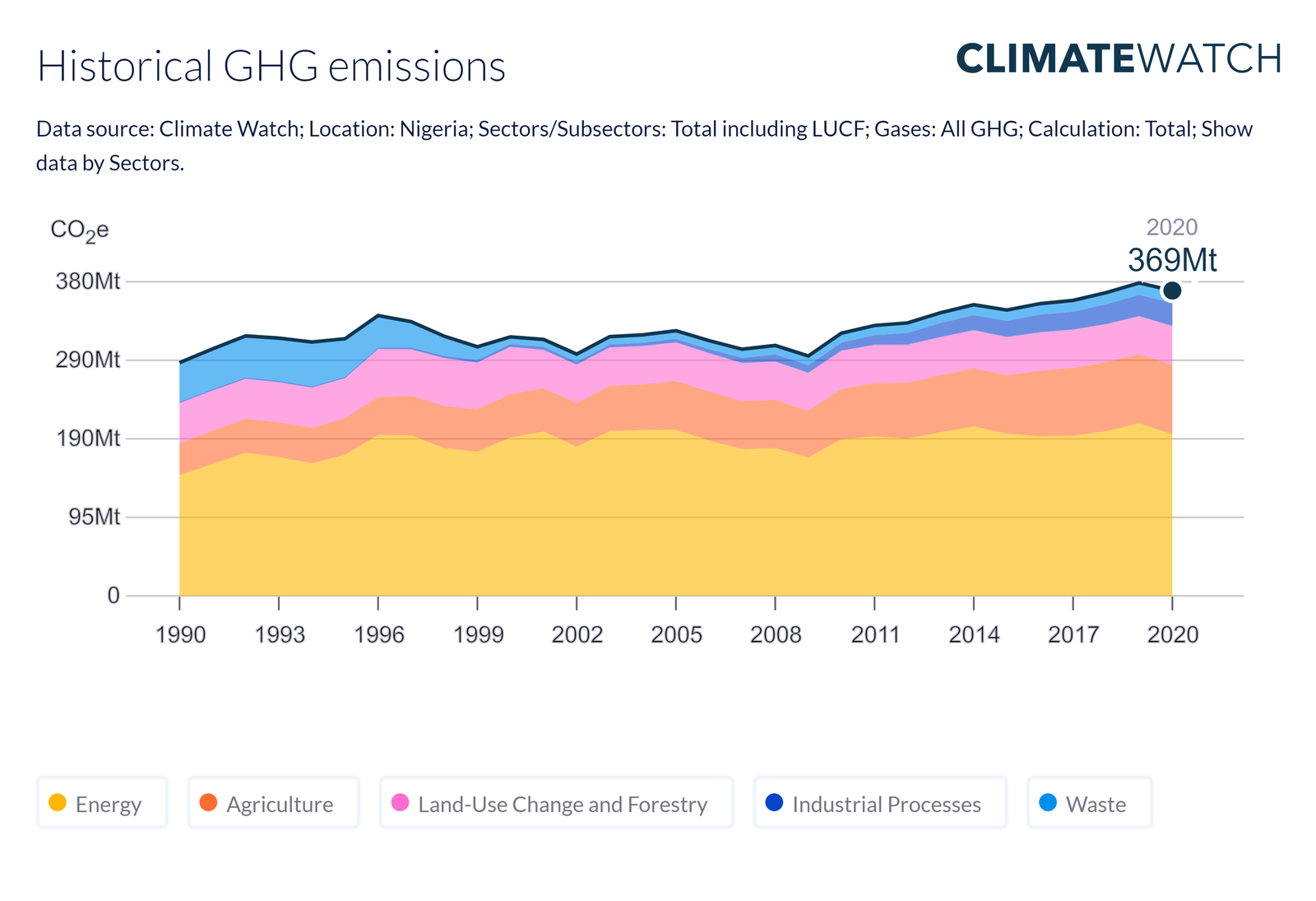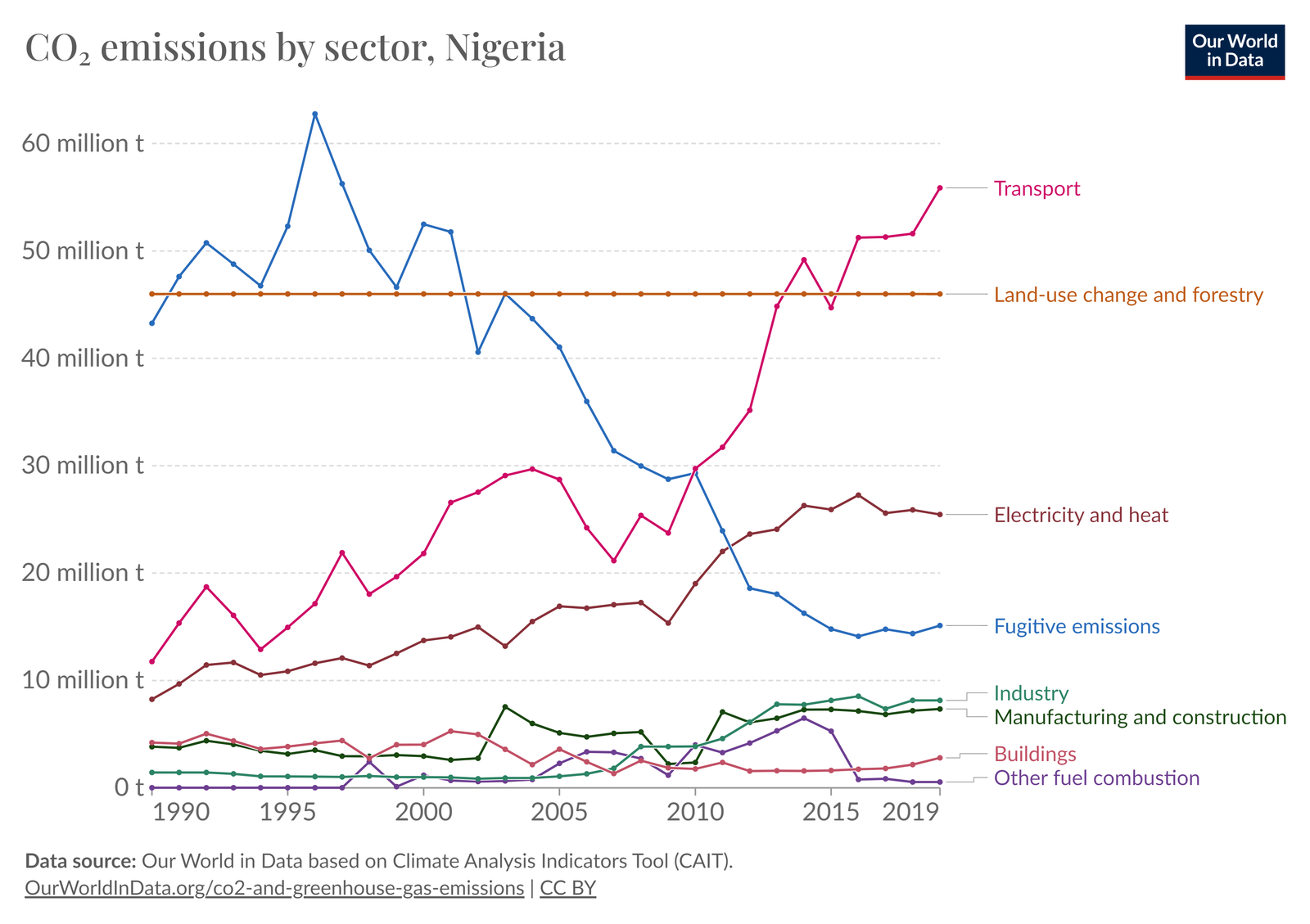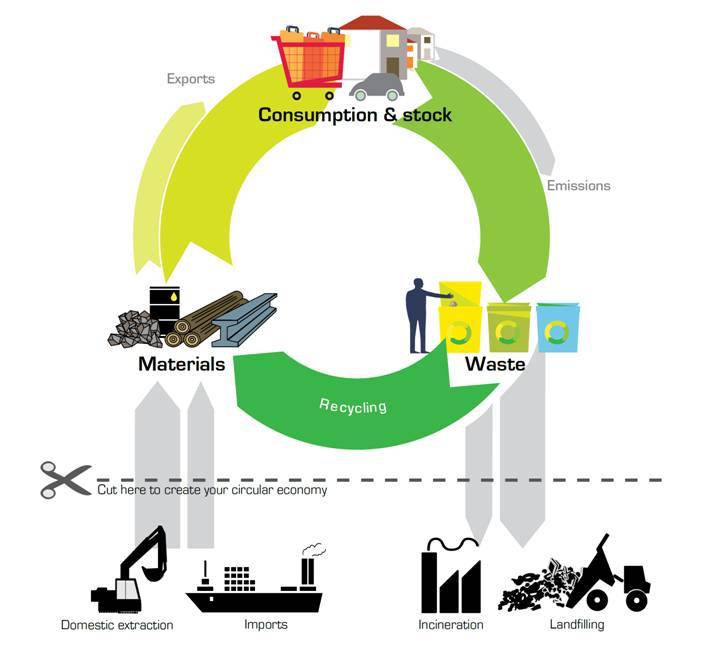A sustainable path for Nigeria: cities of tomorrow


· 4 min read
Nigeria is urbanising, with more people moving from rural communities to urban areas in search of a better quality of life. Nigeria’s urbanisation rate is currently above 53% (Fig. 1) [1] and at a growth rate of about 2.8-3% a year. This trend has become alarming, and consequently, cities have undergone high rates of growth, causing an urban expansion rate of 5-10% per year. [2] Nigeria’s urban population is estimated to double in the next two decades.
Figure 1. Nigeria’s urbanization rate

Cities are the center of economic development, thus offering opportunities for growth and prosperity, but therein lies the problem. Cities represent more than 70% of global greenhouse gas (GHG) emissions [3]. Although the entire African continent contributes less than 4% to global emissions, this gives countries like Nigeria the perfect opportunity to get it right and build towards a zero-emission future.
Figure 2. Historical GHG emissions in Nigeria

What was once a small port town has now become one of the largest cities in sub-Saharan Africa. Due to the fast, unplanned urbanisation in Lagos, the city has sprawled outwards [5], with low-income families searching for affordable housing.
Figure 3. CO2 emissions by sector in Nigeria

Nigeria has historically been heavily dependent on burning fossil fuels as its main energy source (Fig. 2), and its biggest city is no exception. In 2050, Nigeria, India, and China are estimated to contribute 35% of urban global population growth [5]. Bigger cities mean bigger emissions, as in the case of Nigeria's energy system, with transportation as the highest CO2 emitter, followed by land use change and forestry, electricity and heating, fugitive emissions (leakages), industry, manufacturing, and construction, etc. (Fig. 3).
Energy systems are very important, and in cities, they play a vital role in economic growth, determining the quality of life and the acceleration of the energy transition. The increase in the utilisation of energy systems results in energy demand and supply becoming increasingly interconnected.
An urban integrated planning model proposing a circular economy emerged as an opportunity for sustainable development, especially in cities [7].
“A circular economy is an industrial system that is restorative or regenerative by intention and design. It replaces the end-of-life concept with restoration, shifts towards the use of renewable energy, eliminates the use of toxic chemicals, which impair reuse and return to the biosphere, and aims for the elimination of waste through the superior design of materials, products, systems, and business models.”
– The World Economic Forum.
Figure 4. Circular economy

Unlike smart cities, which heavily use information technology to assist sustainability, in circular economies, all industries and elements of the urban ecosystem are involved.
Efficient material management: In a circular economy, policies will be developed to enable various sectors, especially manufacturing, to adopt resource efficiency practices that would reduce waste and production costs.
Reduction of toxic substances: Circular economy policies would also be concerned with reducing overall toxic substances released into the environment through practises like decentralised renewable energy systems and energy efficiency, among others.
Energy efficiency: A circular economy is also guided by strategies that promote energy efficiency, ensuring the reduction or total elimination of energy waste, which would make energy available even to the most marginalized populations.
Economic incentives: A circular economy also uses economic incentives such as tax exemptions to encourage members of the population, especially industries, to adopt regenerative practices like the use of renewable energy and energy efficiency.
With the growing rate of existing cities and the emergence of new ones across the world, it is important for decarbonization strategies to be adopted for a sustainable future. Nigeria's low contribution to global emissions poses an opportunity for its cities to improve their energy systems by adopting the circular economy model and through practices like effective waste management, resource management, energy efficiency, and economic incentives.
Future Thought Leaders is a democratic space presenting the thoughts and opinions of rising Sustainability & Energy writers, their opinions do not necessarily represent those of illuminem.
[1] https://www.statista.com/statistics/455904/urbanization-in-nigeria/ [2] https://www.ncbi.nlm.nih.gov/pmc/articles/PMC5676403/#:~:text=T he%20country%20is%20undergoing%20rapid,in%20the%20next%20tw o%20decades.
[2] https://publications.wri.org/transformations-equitable-sustainable- cities
[3] https://www.macrotrends.net/countries/NGA/nigeria/ghg-greenhouse-gas-emissions#:~:text=Nigeria%20greenhouse%20gas%20(ghg)%20emissions%20for%202020%20was%20322%2C336.50%2C,a%203.11%25%20increase%20from%202017.
[4] https://www.wri.org/insights/too-many-cities-are-growing-out-rather-3-reasons-thats-problem
[5] https://www.irena.org/-/media/Files/IRENA/Agency/Publication/2016/IRENA_Renewable_Ene rgy_in_Cities_2016.pdf
[7] https://www.ispionline.it/en/publication/cities-tomorrow-circular- cities-22057
Hannah Ritchie, Pablo Rosado and Max Roser (2020) - "Emissions by sector". Published online at OurWorldInData.org. Retrieved from: 'https://ourworldindata.org/emissions-by-sector' [Online Resource]
https://zerowasteeurope.eu/press-release/press-release-what-is-needed- for-circular-economy/ [Online Resource]
illuminem briefings

Pollution · Nature
illuminem briefings

Pollution · Cities
illuminem briefings

Cities · Sustainable Living
Euronews

Pollution · Cities
CNN

Pollution · Cities
Politico

Carbon · Pollution